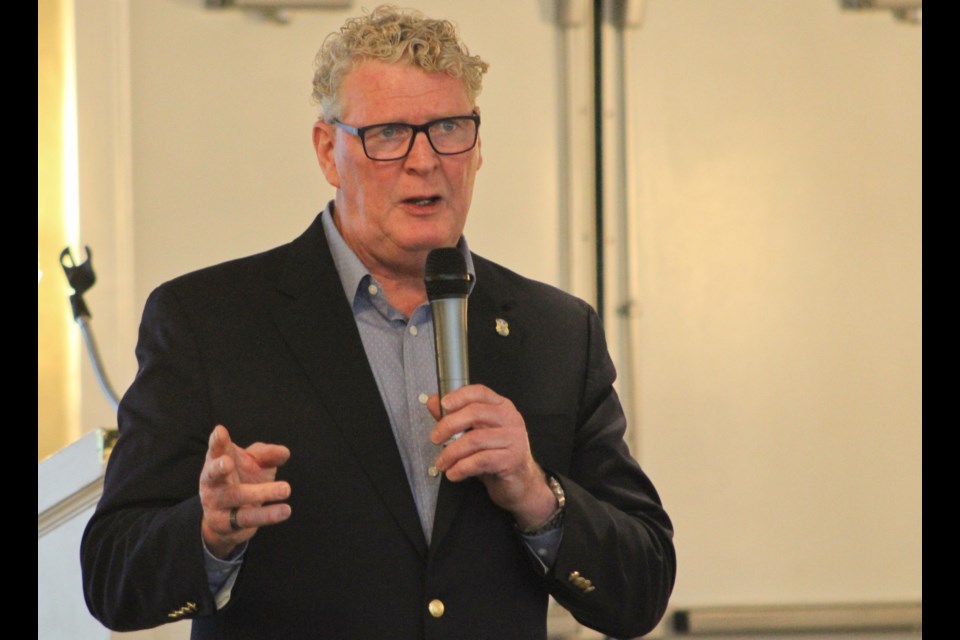Orillia is planning to take a step of reconciliation with its Indigenous neighbours.
On Monday night, city councillors voted to have staff work “collaboratively with local Indigenous organizations and leaders” on the wording of a land acknowledgement that would be read at council’s regular meeting in June (to mark National Aboriginal Day and the Summer Solstice) and at the inaugural meeting of each council term.
Representatives from the Chippewas of Rama would be invited to conduct a presentation at those meetings.
At the urging of Mayor Steve Clarke, council also authorized him to write a letter to the provincial minister of education requesting “the curriculum be amended to include enhanced Indigenous studies.”
The decision is subject to ratification at Monday night’s council meeting.
Clarke, in his second term as the city’s mayor, said heading up the municipality has been “an extremely meaningful experience.” But he said he has, at times, been “profoundly embarrassed” by “not knowing much about our Indigenous past” despite growing up “in the shadows of Beausoleil First Nation.”
He said he was recently invited by former OPP commissioner and current Senator Gwen Boniface, who lives in Orillia, to join others in a local truth and reconciliation roundtable process that is ongoing. It has been, he said, an eye-opener.
“I was aware there were treaties in place at one point and also aware that many were broken or not honoured,” the mayor said. “I was certainly aware that, at some point, our First Nations friends … (were) forced onto reserves. I was unaware that up to just a few decades ago, they needed written permission to leave the reserve. I was unaware that they didn’t have the right to vote until roughly 1960 … this after many of them fought war campaigns for Canada,” said Clarke.
“I was unaware of the full extent of the residential school system and the ramifications and decades it’s going to take to rectify (that),” he said, adding he was also “largely unaware of the 60s Scoop. These are things that many of us in this chamber cannot fully appreciate,” said Clarke in advocating for the land acknowledgement.
Coun. Ted Emond said a land acknowledgement “is an important first step” in reconciliation.
“When I think about reconciliation, it’s not just the fact we occupy lands that were occupied many years ago by our Indigenous people, it’s the behaviours of the generations of us that have caused many of the ills and much of the need for reconciliation,” said Emond.
“A land acknowledgement doesn’t acknowledge that and I am excited by the fact we could incorporate in our June meeting more than just the words,” Emond said. “We could do something meaningful.”
Clarke suggested a smudging ceremony could be part of the event.
“I think our culture could be richer and better if we could work more closely together - not just us acknowledging the fact we’re on their land and we may have created the problems, but they in turn helping us to better understand how the Indigenous people think about their life and their existence,” said Emond.
He said bringing “some of those values into what we do in our nation” would make it “a better place .. and that can only happen through dialogue.”
There was a consensus around the council table that reading a land acknowledgement at every single council meeting was not necessarily the right option.
“The theory is if you do it too often, it becomes less meaningful, so I don’t think it should be done at every meeting,” said Coun. Tim Lauer, who championed the approach that was endorsed by his colleagues.
Coun. Mason Ainsworth echoed Lauer’s sentiment.
There’s a worry it loses “somes of its value if you do it every meeting,” said Ainsworth.
Clarke agreed and, referencing his lack of knowledge, also pushed to ensure there was an educational component.
“I’m going to suggest to you I'm not an uneducated person, but if that’s my level of knowledge coming into this job at my stage of life, I’m going to suggest that there’s a general lack of education in the general public,” said Clarke.
Council gave him permission to write a letter to the minister of education, “asking them to incorporate a more wholesome aspect of Indigenous issues in our curriculum so that when we leave public school, high school or post-secondary that we have a better understanding of our actual history.”
If the decision is ratified Monday, staff will work to develop the wording for the land acknowledgement.
“It was suggested that the final version include specific reference to Rama First Nation, the Chippewa Tri-Council and the Williams Treaties,” noted a report to council committee tabled earlier this week.
“It should also include a statement of commitment from the City of Orillia to its Indigenous communities,” the report suggested.
“As with other municipalities, staff will work collaboratively with local Indigenous organizations and leaders on wording for the land acknowledgement,” concluded the report.
BACKGROUND
A land acknowledgement recognizes the traditional territory of the First Nations peoples who were stewards of this land long before the arrival of European settlers.
The release of the 94 "calls to action" (or recommendations) in 2015 by the Truth and Reconciliation Commission of Canada brought this issue to the national consciousness. Today, organizations including federal, provincial and municipal governments, are taking steps to rebuild trust and relationships with treaty partners and Indigenous peoples.
Land acknowledgements are small, albeit important, steps in the process to reconciliation and developing stronger relationships with Indigenous peoples, noted the report to council.
Land acknowledgements are recited out of respect for the enduring relationship Indigenous peoples have with the land and should take place within the larger context of genuine and ongoing work to build real understanding, and to challenge the legacies of colonialism.
